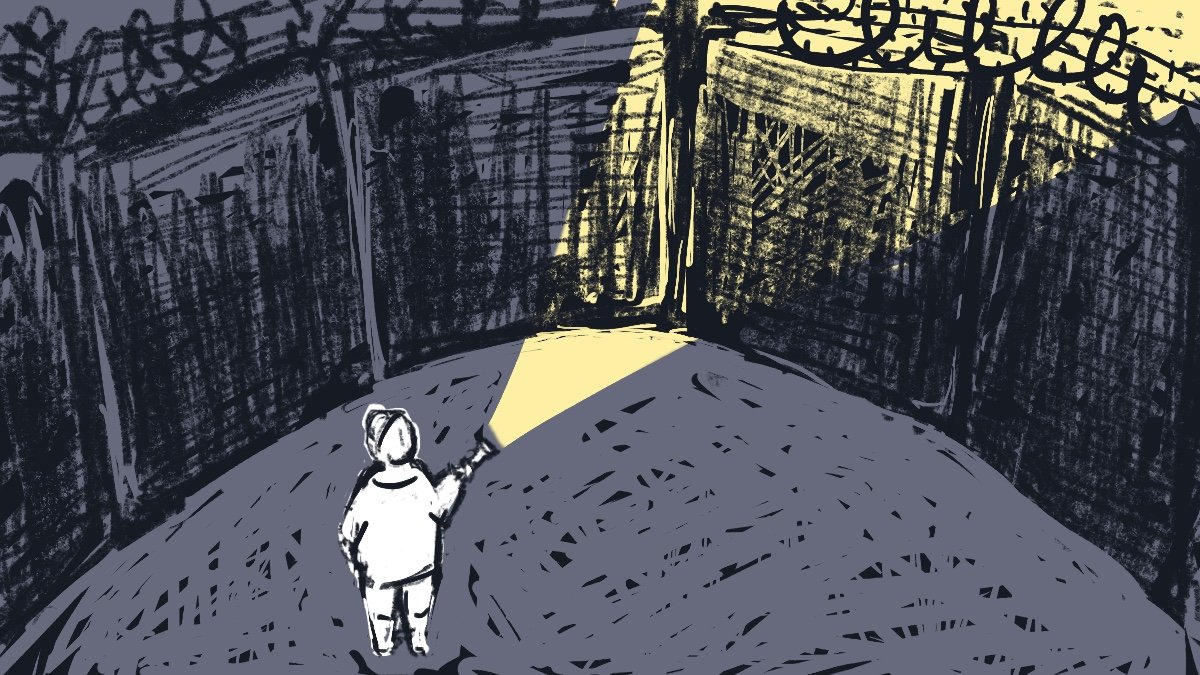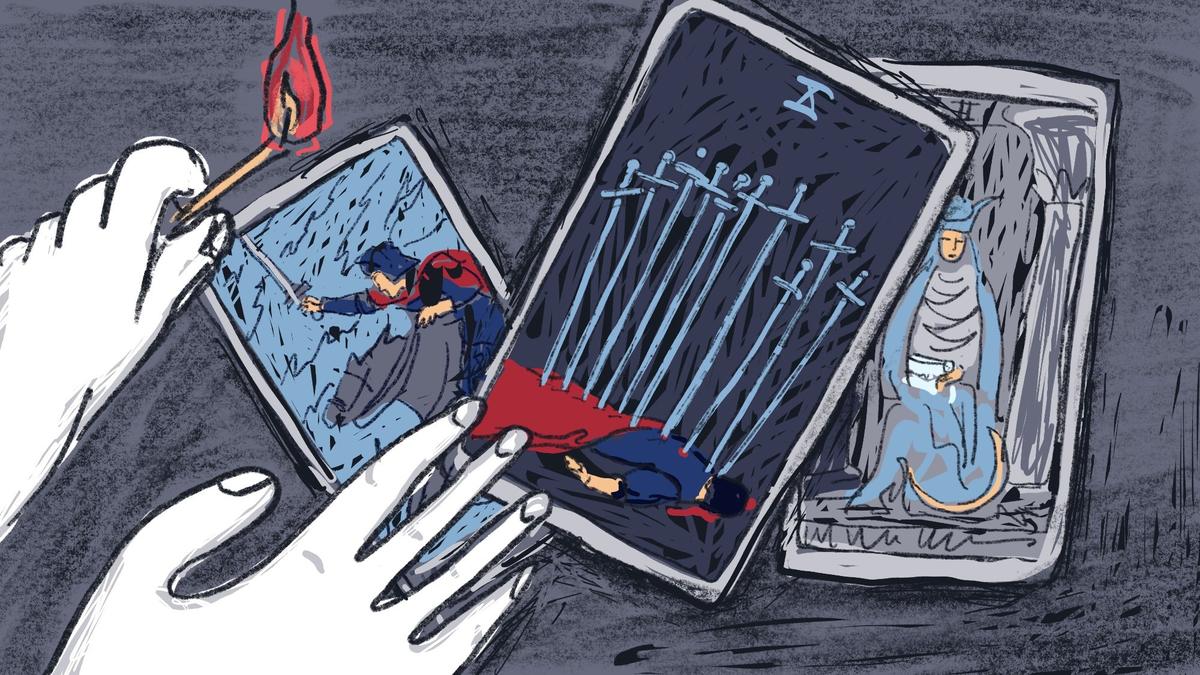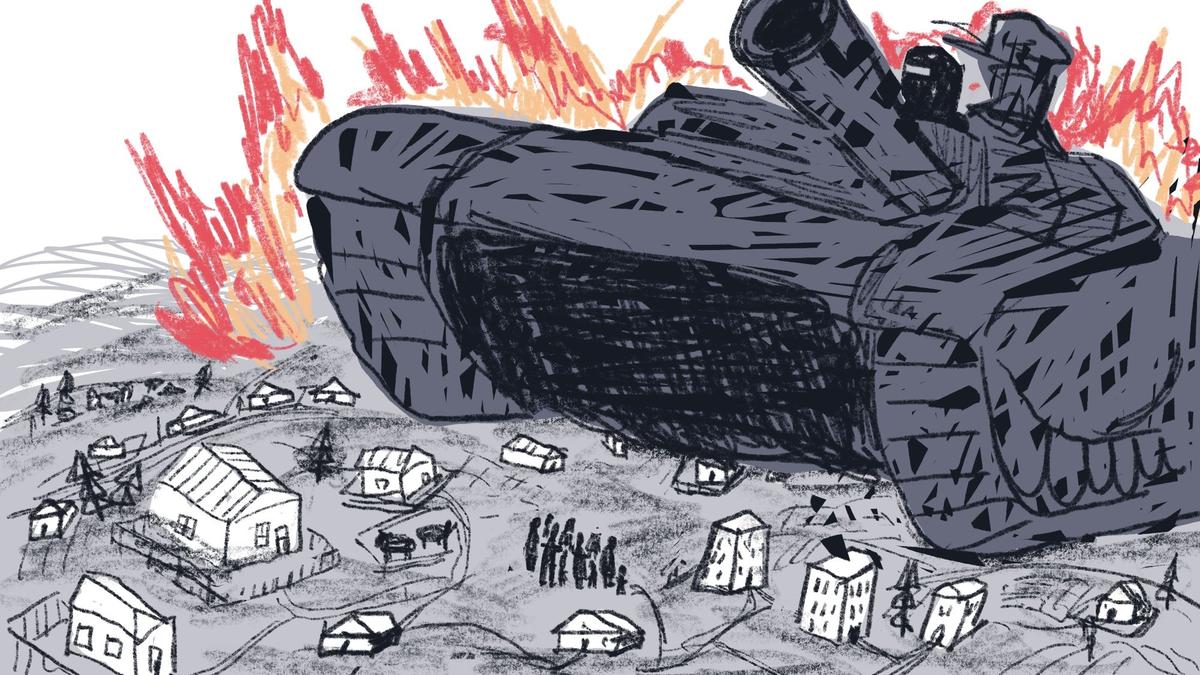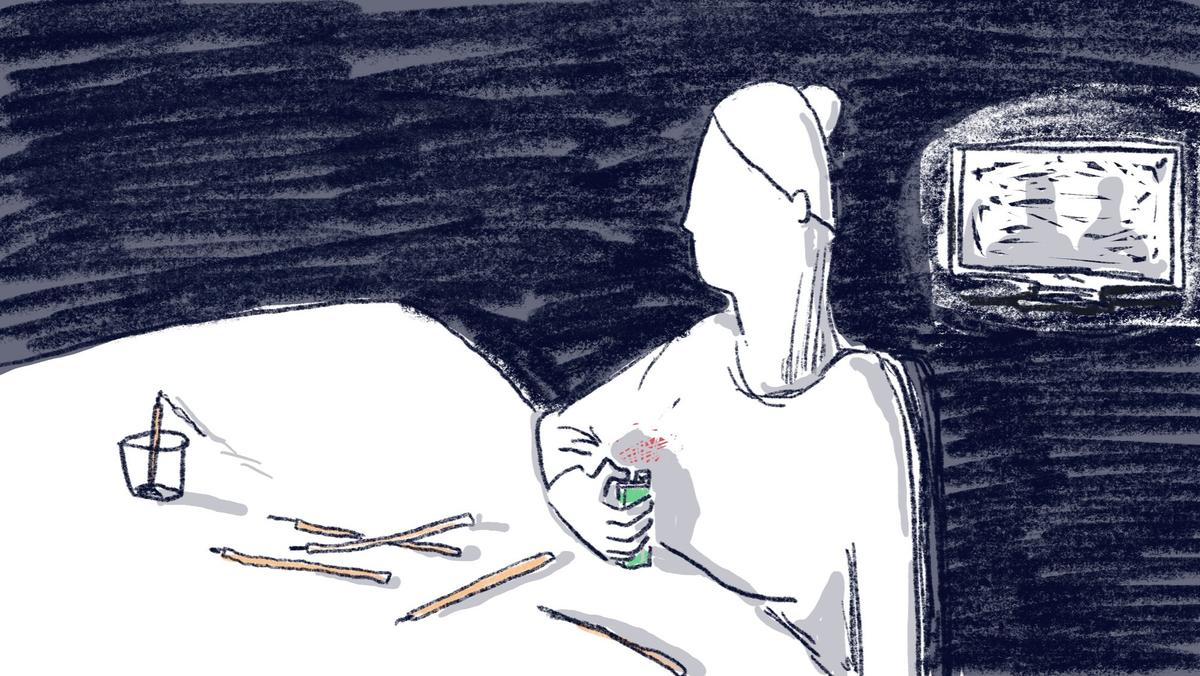We replaced all the names in this story with fake ones for the heroine’s safety.
“Hey, is there anyone home?” I yell over the fence, but there is no response.
“Lyuba’s home, get in,” says a female voice. That’s a voice of an elderly woman from the neighbouring house. She looks at me warily, but then becomes less tense. “C’mon, get in, will you? There’s no dog up there.”
Lyuba, 59, is sat at the table in her kitchen. She is staring into space, holding a cheap green lighter in her right hand. Sometimes she clicks it but doesn’t actually set anything on fire. On the table in front of her are thin brown church candles, one is inside a lowball glass, half-burnt. The TV set is mumbling things in the background, however, there is a feeling of deafening silence near Lyuba, as if time has stopped inside this kitchen.
Sasha, please respond
The lighter Lyuba is holding belongs to Sasha, her son, a college-educated professional serviceman. The day I meet Lyuba is his 30th birthday. She says he was a long-awaited child, and his father left the family shortly after, but Lyuba holds no grudge. Sasha has taken care of his mother and his younger sister from an early age, so Lyuba has always been happy about him.
He finished his mandatory service in Ukraine’s army when the War in Donbas started. Sasha signed a military contract in 2014 and was sent into the battlezone right away. When he returned home a year later, he was a different man, Lyuba says. He used to be an affectionate boy before; the war turned him into an aggressive grown-up man. Sasha got used to drinking and getting into street fights, and he also screamed horribly in his sleep.
Lyuba’s tears and doctors helped him get back to normal after several years of absolute hell. Sasha came back to life, quit drinking, started to care about his relatives, and re-trained from a scout into a junior medical officer. He told his mother he would never go to war again.
“He used to live in Odesa, said he was into bitcoin or something,” Lyuba recalls. “He often sent me money. I was afraid he could go to war again. In March, I received a money transfer from some military unit and asked him what that was, he told me it was his friends’ money. So, I believed him. Sometimes I tried calling him, and it was either no response or voice mail. I didn’t want to bother him, he’s a young lad after all. I could often hear birds chirping when I spoke to him. He used to live on the seventh floor, what kind of birds were those? He told me: “Mam, I’m not in the army, what makes you so nervous?”
When Russia’s army occupied the Kherson region, Sasha sent his mother some money and told her to leave for his Odesa home or for Poland where Lyuba’s daughter, his sister, was resided. Lyuba refused: “How can I leave town if I’m uncomfortable when I sleep in another room within my own house?” He was mad, said his mother was egoistic leaving her children worried that she would now live surrounded by enemy soldiers.
Lyuba was in her garden on 21 May, and she left her phone charging in her house. When she picked up her phone again, she saw she had a missed call from Sasha. As she tried calling him back, she would always get redirected to his voice mail. Lyuba was calling and texting him several times a day for a week straight. The voice mail was a misleading thing. It turned out later that Sasha’s phone company keeps supporting voice mail accounts even if the customer’s phone is off for months.
After a week out of touch with Sasha, Lyuba started to panic. She couldn’t go to Odesa at that point as there was no way of leaving the occupied territory. So, Lyuba and her daughter started searching for Sasha remotely.
“I recalled that he once used my debit card to send money to some girl in Odesa, so we started searching for her. My daughter found out her name was Yulia and contacted her. Yulia told us she hadn’t been able to reach Sasha on the phone for a week just like us. She also said he went to the local draft office on the same day the war started and signed up to go and fight the invaders.”
Shortly after, Sasha appeared online on Viber. Katia, his younger sister, texted him, but some other man replied to her: “Hey, this isn’t Sasha. He’ll get back home when it’s all over.” When Lyuba learned about this, she also texted: “Please, tell me where my son is”. She, however, received no response. Sometime later Russia’s servicemen cut the Kherson region off from all sorts of communication: no Ukrainian telephone company or Internet provider was functioning.
After two weeks, Russia brought in SIM-cards with no logos; buying one required and ID. Ukraine’s phone companies are still unavailable here, while some minor Internet companies still provide their services. Lyuba did not buy a Russian SIM-card, but she was lucky as her Internet provider kept operating on the occupied territory.

Art by Alisa Krasnikova
A captive, but a living one
“Lyuba was so worried about her son’s fate that she couldn’t walk the next day she received that message,” says Ivan, Sasha’s godfather. “It’s been several months since then, and now she can walk again, but she barely leaves her house these days.”
Cash machines stopped working, too. Lyuba lost her job as the factory she worked for closed when the Russians occupied the region. She used to rely on the money from her son, so now she’s literally on the verge of starvation. Lyuba never complained about it, though. Her neighbours noticed this and sounded the alarm. They started visiting her every morning for a coffee, taking turns, shared rumours with her, tried to cheer her up, and brought some plain meals. Soon her friends learned about what was going on, so the woman always had someone to help her and keep her company.
“I was going insane back then,” says Lyuba, barely holding back tears. “What’s going on with my son? Where is he? No reply. When my Ukrainian Internet provider started working again in early July, I could finally text my daughter every now and then.”
Katia sent the voice messages that the unknown man had sent her using her brother’s phone: “Yes, Sasha is in captivity. He is okay. My name is Sergey, I’m the guy who took him as prisoner. We did nothing wrong to him, he is being held in a good place. We visited him and his fellow captives, they’re OK. They will return home when the war is over.” And another voice message later on: “We did nothing wrong to him and his comrades. After we captured them, I learned that they were being mistreated, so me and some of my comrades visited the place he was being held in. We explained to the guards that they should not be touched, that we are sort of responsible for them. They are OK guys to me: we offered them to surrender themselves and they agreed, so we made the deal. We were promised that they would be fine. When I get there, I’ll send you a picture of him, or a video, if you need one. Perhaps I’ll even let you talk to each other. So don’t worry.”
The message was sent on 31 May. Sergey contacted Katia several more times after that, asking her what she thought of this war. He demanded no ransom whatsoever. She called him back later, and Sergey told her he was wounded and sent to a hospital. He also said he knew nothing about Sasha from that point.
The two women posted things all over the Internet, trying to find out Sasha’s whereabouts. The only thing they managed to find out was that Sasha went missing in late May in the vicinity of Lyman, a city in the Donetsk region that was captured by Russia after heavy combat in May and re-captured by Ukraine on 1 October. Ukraine’s authorities told Lyuba and Katia that Sasha was not on their list of KIA and wounded combatants, so he was declared missing in action.
“My daughter called all kinds of boards up there,” Lyuba says. “I couldn’t do it since our settlement had been cut off from Ukraine’s network. Katia found out that Sasha was registered as a POW, but his fate would remain unknown before Russia includes him on the POW exchange list. At this point his name was never mentioned by Russia’s side, so he was declared missing in action. Now Katia needs to travel from Poland to Ukraine and have her DNA samples registered in the database. They tell me I should contact the police to get things clarified. Who can I contact here in the occupied area, you tell me? Is anyone going to explain to me what’s going on? At this point I’m neither dead nor alive,” Lyuba says. “When I found out Sasha had been captured, I couldn’t utter a word. They cut off the mobile network, so all I had was uncertainty. I could only hope my son was alive, let alone he was a captive. And this Sergey guy gave me some hope, so all I can do is wait...”
Not able to endure the anxiety, Katia turned to a tarologist. The cards showed that things were bad for him as the fortune teller told Katia that Sasha was “still alive but terrible things were happening to him.” “There’s a woman beside him, and he is not quite himself, so to say,” the cards read. Lyuba asked Katia to visit the tarologist once more in a month’s time, and the fortune teller said Sasha “could get killed, he was trying to prove something and argued about things.”
“Sasha is a hot-tempered guy,” Lyuba says, nearly crying. “It’s horrible to think happens to people in captivity. I’m afraid to read or watch anything about this, because that would drive me totally insane.”

Art by Alisa Krasnikova
Occupation
“It’s devastating to see what my city has turned into these days,” Lyuba says. “They [Russia’s servicemen] say they will wipe us out, tear us limb to limb if they are forced to leave the place, and they mean it. Some locals say that they are fine lads. Don’t you guys understand? They are only fine until they’re ordered to kill each one of us.”
Hola Prystan, a small resort town in the Kherson region located on the eastern bank of the Dnipro River has been under Russian occupation since day one. Soldiers go to the same grocery stores the locals do, and they visit the city market in the weekend together. They used to reside in a local spa retreat for a few months, surrounding the building with Czech hedgehogs, and now they forced locals out of their homes and occupied their detached houses.
“These rashists are weird people,” Lyuba says. “They destroyed all the furniture and bathroom accessories in the spa building. Like what for? The scariest thing is that they set up a torture chamber in a gym I’ve been visiting for years. And they burn the corpses of their own soldiers, too, here at the dump site near Kherson. My relative was travelling from Krasnoznamianka by bus, she told me there were dead Russian soldiers along the road, so no one buries them. Russians say they never ‘leave their kind in trouble.’ Yeah, right. Look what you do to your own soldiers!”
Locals say that when the occupation troops stepped into the town, there were betrayers who handed them the lists of Donbas War veterans.
“When it all started, Sasha told me to burn all of his military items,” Lyuba says. “He constantly asked me if I got rid of them. “Mam, have you disposed of my items? Burn them! I don’t need those.” How can I just throw them away? So, I put all those things in a sack and hid it behind a gas water heater. When they started searching homes in our town, I decided to hide it in a better place. It turned out eventually that Russians were looking in such places specifically. But I couldn’t just burn them, I didn’t have the heart to do it. So, I gave the sack to my sister, she went to her countryside house and dug it in her vegetable patch. My relatives gave me an old push-button cell phone and hid my smartphone since there were lots of pictures of my son wearing military uniform. I didn’t want to delete those, there’s very little of what’s left from my son.”
Lyuba also tells me about Natasha, her friend:
“She lives in a rich two-storey house. When the rashists came, they forced everyone out of the house and searched it; they were looking for weapons but didn’t find anything suspicious. The thing is: they have toilets on both floors, and another one outside. They were wondering why would a family need three toilets. You know what they call our Hola Prystan? Rublyovka (a prestigious residential area in the western suburbs of Moscow where Russia’s richest people reside, including oligarchs and government officials — translator’s note). If our town is Rublyovka, then what kind of shithole do they live in? A group of more or less sensible soldiers arrived lately, the ones who realise that they don’t belong in here. They say we don’t need to be liberated, and they admit we lived a better life before they came. These ones are the lesser evil, but remember what happened in Bucha and Izyum? What kind of people were in charge there?”
At this point Lyuba finally falls into talk, her voice becomes louder and less monotonous. She remembers that there are some pancakes in the fridge and offers me some tea.
“I think we’re going to make it somehow, this is our homeland, and we hope for the victory,” Lyuba says. “But there are some people, you know... There’s a woman named Lyda, she once dropped by, told me she didn’t care and only wanted peace. What do you mean you don’t care? You want us to creep around on tiptoes, afraid of giving a wrong look all time? How much people have we lost since 24 February? Remember Irpin, Bucha... There’s no way we can negotiate with those bastards. Your Putin should have invested money into science, education, and healthcare instead of warfare; your country would develop so great that the entire world would be jealous and willing to be friends with Russia.
Sasha told me many times that I should leave. All my acquaintances left at the same time, but I just can’t. You know, some people have no money to leave, some have nowhere to go. I had both money from Sasha and Katia waiting for me in Poland. I just couldn’t make it.
Many people turn their backs on their relatives and friends just because they are Russians. I think it’s wrong. You can’t treat a person like this if they do something, if they are against the war, or at least if they don’t come here to kill people. Striking someone out of your life because of their ethnicity is over the edge. We have douchebags among us Ukrainians, too. If everyone was perfect, there would be no collaborators.
Russians showed a huge crowd of locals queuing up for Russian passports on their TV; this is bullshit. They filmed a crowd before the city council where the old people received their 10,000 ruble handouts. Passports are being issued in a different place. I just don’t get why so many well-off people here go to get those handouts. Some keep receiving Ukraine’s money using their debit cards. I understand the old people who used to receive their retirement money from Ukraine Post offices, and now they don’t have it. They literally have nothing to eat. On second thoughts, the more money Russians give away, the less money they will have for munitions. Some acquaintances of mine received Russia’s handouts and donated the money to Ukraine’s army.

Art by Alisa Krasnikova
***
When someone says anything about the captives on TV, or mentions torture, Lyuba switches the TV set off right away, she cannot stand this.
“It’s because of my son. I pray all the time and try to think positive,” she says. “The day before that missed call from Sasha, I had a dream where he kind of disappeared. His things were there, but my boy was gone. I cried and called him by his name, but there was only silence. And I also saw him in one of my dreams after I learned that he was in captivity. I could feel him touching me, he nestled close and said quietly: ‘Mam, can I do the cleaning tomorrow? I’m so sleepy.’ To which I responded: ‘Of course, my dear son. Go to bed, you’ll have enough time to do the cleaning.’”
About 7,200 servicemen of Ukraine’s Armed Forces, Security Service, National Guard, and State Border Guard Service are declared missing in action, Oleh Kotenko, the country’s Commissioner on Persons Gone Missing under Special Circumstances, reports, adding that Ukraine’s Armed Forces alone have about 2,000 such servicemen. “Look, there are Armed Forces, and there is the Security Service, the National Guard, and the State Border Guard Service, too. Those are different organisations, so, there are about 7,200 in total,” Kotenko says.
He said earlier that there were 6270 persons gone missing under special circumstances, 90% being servicemen.
Anna Malyar, Ukraine’s Deputy Defence Minister, says that 24 POW exchange rounds were made as of 2 October, and a total of 808 people were rescued from the Russian captivity.
Neither side states the exact death toll of the Ukraine War.
Join us in rebuilding Novaya Gazeta Europe
The Russian government has banned independent media. We were forced to leave our country in order to keep doing our job, telling our readers about what is going on Russia, Ukraine and Europe.
We will continue fighting against warfare and dictatorship. We believe that freedom of speech is the most efficient antidote against tyranny. Support us financially to help us fight for peace and freedom.
By clicking the Support button, you agree to the processing of your personal data.
To cancel a regular donation, please write to [email protected]

